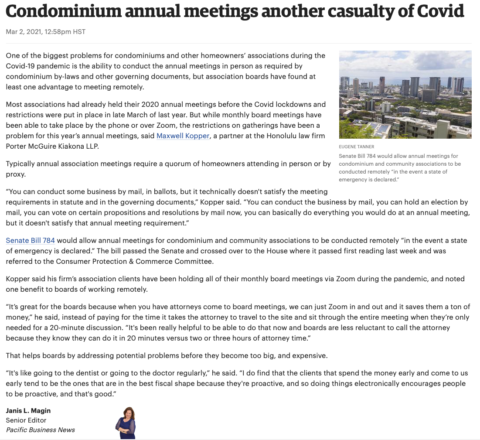

As the kupuna of our families go through the aging process, there may be times when other family members need to take over as decision-makers for certain aspects of their lives.
This type of arrangement, known as guardianship for an incapacitated adult, can occur if any adult relative becomes mentally or physically incapacitated.
Guardianship for incapacitated adults can be limited or unlimited. In a limited guardianship, the court grants specific powers, such as only medical decisions or tasks, which might include ordering prescriptions, obtaining a disabled parking pass, or securing a service animal.
An unlimited guardianship allows one to make all of the decisions for the incapacitated adult, including financial decisions, such as receiving money on their behalf and using that money to pay for their expenses. Whenever feasible, the Court grants only those powers which are necessary due to the adult’s limitations.
In order to establish legal guardianship of an adult, one must file a standard petition with the court explaining who requires guardianship and why, the proposed guardian, and a note from a physician explaining how that adult is incapacitated.
The court prioritizes potential guardians in the order of relationship to the incapacitated person in the following order:
- Parents
- Siblings
- Children
- Unrelated caregivers
The person petitioning for guardianship will also need to notify any other potential guardians and request a waiver and consent from them.
The court then schedules a hearing in which the petitioner provides the judge with the doctor’s letter, any waivers from other potential guardians, and a financial report for the incapacitated person. If there is a current caregiver, such as a nursing home, they will also need to be notified.
A petition for guardianship is usually granted if the reason for the request is confirmed by a physician and there are no objections by other potential guardians.
Following an approved petition, the potential guardian will need to file reports to the court annually, including information about the condition of the incapacitated adult and the status of their finances.
Overall, establishing guardianship for an incapacitated adult in the state of Hawaii can be easily navigated with the help of an experienced attorney. Seth Harris, senior associate with the PMK Family Law Division, is able to take you through the steps so you can make the best possible decisions for your kupuna.


Every year, in celebration of women’s contributions to history, culture, and society, the President of the United States proclaims March as Women’s History Month. It began in 1982 as Women’s History Week to recognize the specific achievements women have made throughout American history in a variety of fields. In 1987, it became Women’s History Month. In recognition of this important designation, the staff of PMK wishes to thank the women of the law firm for their extensive contributions to the company and their community.
- Laree McGuire – Partner
- Rebecca Szucs – Of Counsel
- Cheryl Fraine – Associate
- Kaitlyn Mark – Associate
- Nari Song – Associate
- Patricia (Hann) Biro– Office Manager
- Bernaden Agudo – Accounts Payable
- Diana Borengasser – Paralegal
- Jenny Caban – Paralegal
- Kimberly McCaskey – Paralegal
- Meredith Ross – Paralegal
- Melody Sakado – Paralegal
- PattiAnn Miyoshi – Paralegal
- Susan Im – Paralegal
- Tracie Kahooilihala – Paralegal
- Anne Lefai – Legal Assistant
- Dawn Daido – Legal Assistant
- Lyn Morillo – Legal Assistant
- Marie Lum – Legal Assistant
- Nanealani Willson – Legal Assistant


There are two types of adoptions – uncontested and contested. In both cases prospective adoptive parents must first gather and file all required documents with the family court and obtain verification from the Department of Human Services (DHS) that they have no history of Child Protective Service allegations or investigations.
If both biological parents agree, the adoption is uncontested and the family court will send the adoption packet to a judge who will schedule a hearing and finalize the process. An adoption can also be uncontested if one or both biological parents have died, in which case the adopted parent is usually a stepparent, grandparent or other relative, or someone approved by DHS.
A contested adoption is often a much lengthier undertaking. Adoption cases are contested for several reasons. For example, a parent wishes to maintain parental rights in spite of having no contact with the child and providing no support, or it is impossible to obtain permission from one or both parents (due to homelessness, drug addiction, prison time or unavailability).
In these cases, when submitting paperwork to the family court, the prospective parents must note that one biological parent has not consented to the adoption.
The family court then schedules a hearing, and a trial if necessary. During the trial, the judge decides whether the nonconsenting parent meets the statutory requirements for taking care of their child. The judge can terminate the parental rights if he or she finds that the parent is not able to provide a safe, stable home for their child, but it is rare for a judge to do so. As in all cases, Hawaii family court judges make decisions based on what is in the best interest of the child.
Seth Harris, senior associate of PMK family law is available to assist in all aspects of adoption, whether contested or uncontested. Contact Mr. Harris at [email protected].


PMK Partner Maxwell K. Kopper was featured in an article titled “Condominium Annual Meetings Another Casualty of Covid” written by Janis Magin from Pacific Business News. Kopper discussed the challenges this year’s annual condominium meetings are facing due to social gathering restrictions.


In Hawaii, a legal adoption is a lengthy process with several phases. Here are some important things to know before commencing the process.
In Hawaii, you can adopt a child if you:
- Are single or married and at least 18 years old
- Are able to support a child financially and provide a safe home environment
- Can pass a criminal and Child Welfare Services background check
The first step is to gather all required documents, complete the required supplemental forms, and file a packet with the adoption clerk. Some of those documents include: a certified copy of the child’s birth certificate, petitioner’s marriage certificate, a death certificate for the child’s mother or father if applicable, and a certified copy of the judgement of termination of parental rights.
A complete list of potential documents and forms to be submitted to the adoption clerk can be found here: www.courts.state.hi.us/wp-content/uploads/2016/11/1FP1044.pdf.
Adoption clerks often request additional paperwork and modifications to submitted documents, so prospective adoptive parents should build in extra time to provide more information and confirm that already provided forms and paperwork are up to date. If anything is incomplete, the court will not set a hearing.
Once the background check is approved and the adoption packet is complete, the adoption clerk will set a hearing date. At the hearing, the judge will confirm the information provided and speak with the prospective adoptive parents and the child (if he or she is old enough) about the relevant background and the reasons for the adoption. If the adoption is uncontested, the court can then move forward to finalize the process.
For assistance with all facets of adoption, contact Seth Harris, senior associate with the PMK Family Law Division, at [email protected].
In the next blog post, learn more about the difference between contested and uncontested adoptions.

